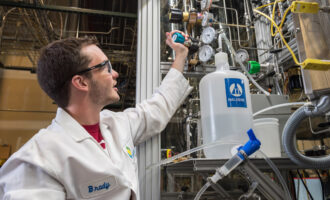China’s Shanghai Starry Chemical to open new additive plant in September
By Vicky Villena-Denton and Aaron Stone
Shanghai Starry Chemical says it is now China’s number one manufacturer and supplier of metalworking fluid (MWF) additives. The company recently announced a new 10,000 metric tonne plant, due to open in September 2017, following a two-year development effort. The plant will further consolidate Shanghai Starry Chemical’s leading position in China and fuel its expansion plans for Japan and the United States.
The facility is located on 20,000 square metres of land in Qidong Binjiang Fine-Chemical Industrial Park, Jiangsui Province; a one-hour drive from the company’s Shanghai headquarters. Boasting the newest EHS (environment, health and safety) regulations, and 28 stainless steel and glass-lined reactors, the plant will supply and serve more than 500 lubricant blenders throughout China.
Despite the significant RMB110 million (USD16 million) investment which is mostly self-funded, Managing Director George Liu says the decision to opt for a brand-new location was an easy one. Expanding the capacity of the company’s current manufacturing plant in Shanghai would have incurred “triple the investment,” he says, due to the high cost of land in Shanghai and stringent local regulations. Further, the location provides strategic advantages including flexibility and proximity to 70% of Shanghai Starry Chemical’s existing Chinese customer base, he says. The existing manufacturing plant will be decommissioned once the Qidong plant is operational.
Starry Chemical dedicates significant resource to “researching, manufacturing and marketing high-tech, high performance and fast growing functional chemicals in the lubricant industry,” says Liu. “We are a technology-driven company, we are not a trading company,” he says proudly. The new capability complements an existing 1,200 square meter research and development center in Pudong, Shanghai, and warehouses in Shanghai, Beijing, Tianjin and Guangdong.
The Qidong manufacturing plant will specialise in the production of additives for metalworking fluids and lube oils. While 70% of the company’s existing revenues come from MWF additives, Liu admits the company’s lube oil additives business is growing at a faster rate. MWF additives are becoming “cheaper and cheaper” in China, he says, citing a lack of restrictions and lower quality products diluting the market. Thus, Shanghai Starry Chemical made the strategic decision to devote greater efforts to lube oils where “there is a standard” and quality is more highly regarded.
Lube oil additive products supplied by the Shanghai-based company include aminic and phenolic antioxidants, extreme pressure additives, anti-wear additives and corrosion inhibitors. These products are used extensively in gear oils, engine oils, industrial lubricants and greases. MWF additives are “much more complicated than lube oil,” says Liu, with multiple product categories such as extreme pressure additives, phosphate esters, corrosion inhibitors, biocides and more.
Despite a noteworthy annual turnover of USD25 million, Starry Chemical is a relative newcomer in the additive manufacture and distribution space—the business was established by Liu in 2004. The company began as a distributor before diversifying into manufacturing in 2008, prompted by severe supply shortages that hindered the company’s business. Liu insists the company needed to produce their own products to minimise the risk of supply disruption.
An in depth understanding of the Chinese additive industry, achieved during 25 years’ involvement, meant the shift to manufacturing was “not difficult,” advises Liu. It was a natural progression, despite the move being induced by external forces.
In the beginning, Starry Chemical’s manufacturing efforts were focused on developing additive packages for MWFs.
 “It was a very good opportunity,” he says. “We didn’t have the resource to manufacture additive components.”
“It was a very good opportunity,” he says. “We didn’t have the resource to manufacture additive components.”
In the early years, MWF additive packages were mostly imported from outside China, Liu says, with Lubrizol dominating the market.
“But I found that imported additives are not [entirely] suitable for the local market,” causing an assortment of problems including rust, foaming, etc., because of different local machining processes, Liu claims. Thus, most of the imported products required modification, he says.
Liu believes this delivered Shanghai Starry Chemical a significant advantage “on the ground” in China. The niche chemical producer now counts a raft of major companies as customers including BP Castrol, Quaker Chemical, Houghton International, Yushiro Chemical, Master Chemical, Total, PetroChina, Sinopec, and many local privately-owned companies.
Despite a successful transition to manufacturing, Starry Chemical remains a significant distributor of additive products throughout China. Liu divulges that the company is the world’s largest distributor of sulfurised extreme pressure (EP) additives of DIC Corporation, a Japanese chemical company specialising in the development, manufacture and sale of inks, pigments, polymers, specialty plastics and compounds and biochemicals. The organisation also represents Dow Chemical, Sonneborn and Solvay. He is quick to say that these distribution arrangements provide synergies with the company’s existing product portfolio as opposed to competition.
Liu started his career in the manufacturing area for Sinopec Jinzhou Petrochemical Co., the earliest lube oil additive manufacturer in China. Then, he became the first sales engineer for the Infineum joint venture with Sinopec (later the joint venture was transferred to PetroChina) in Jinzhou called JINEX in 1996. Liu moved to the joint venture’s office in Shanghai in 1998. He left in March 2000, after the Shanghai office was closed and its business shrank. The Jinzhou joint venture no longer produces additive packages, only poly-isobutylene (PIB), says Liu.
Shanghai Starry Chemical’s imminent focus is on developing the international export market. Liu believes there are greater opportunities in Japan and the United States. They have made a “good start in Japan,” he says, and are looking to have a distributor in the U.S. “maybe next year.” Interestingly, he warns the Chinese additive market has “too many competitors” and is saturated “to some degree.”
Europe is seemingly off limits for now. Global regulations are already becoming more stringent and costly, and despite being very confident in the quality of his products, in Europe “REACH is a nightmare for a small company,” he attests.
Building confidence in a Chinese company within the Asia region can be challenging. Within China, Shanghai Starry Chemical has already forged a strong reputation. The company’s efforts are now focused on raising awareness outside of China – to position the manufacturer as a true R&D, tech-driven company. Liu believes the R&D facility, which opened in 2014, and the state-of-the-art Qidong manufacturing plant will go a long way to achieving this.
In the future, Liu predicts, Shanghai Starry Chemical’s competitors will be “big companies not small companies”; however, he firmly believes his small, nimble additive business maintains an advantage in this space.
Liu admits that getting into the engine oil additive package market, which is currently dominated by four foreign players, is difficult for a small company like Shanghai Starry Chemical.
“We can’t afford the investment, not even PetroChina and Sinopec. We focus on niche additives. That’s our strength,” he says.







